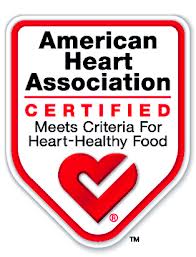
The American Heart Association’s Heart Check mark for heart healthy foods has been approved for use on the Mississippi Peanut Growers Association's promotional packages of peanuts. Malcolm Broome, executive director of the group, says “We want everyone to know that our peanuts are heart healthy, and we're excited to be able to promote this with our Mississippi peanuts.”

The Mississippi Peanut Growers Association was the first peanut organization in the nation to earn certification to use the American Heart Association’s Heart Check mark for heart healthy foods on it’s promotional packages of peanuts.
Malcolm Broome, executive director of the group, says “We want everyone to know that our peanuts are heart healthy, with a lot of vitamins and minerals; they’re power packed with energy, and right now are they’re the cheapest source of protein. All of this gives us a positive image for heart health, and we excited to be able to promote this with our Mississippi peanuts.”
He says the MPGA decided early spring last year to pursue approval to use the Heart Check mark on the bags of sample peanuts given away at various events.

A TEMPTING ARRAY of peanut foods was offered at the annual meeting of the Mississippi Peanut Growers Association.
“We worked with Leslie Wagner, executive director of the Southern Peanut Growers, the trade association that represents peanut farmers in Mississippi, Alabama, Georgia, and Florida, and the American Heart Association to learn how to meet their requirements. We also worked with the Peanut Institute on the nutrition information that was needed, and finally got approval from AHA to use the Heart Check mark, and to have our peanuts on the elite list of foods that have been certified as heart healthy.
“The Heart Check mark is one of the most recognized symbols on food packages today,” Broome says, “and a majority of grocery shoppers trust that mark to guide them in making heart healthy choices.”
“AHA certified foods must meet specific nutritional guidelines. They must have 4 grams or less of saturated fat per 50 gams, less than 0.5 grams of trans-fat per serving, no cholesterol, 140 mg or less of sodium per serving, and 10 percent or more daily value of at least one beneficial nutrient, such as fiber. Raw peanuts, oil roasted unsalted peanuts, and even oil roasted salted peanuts meet these requirements.
“The AHA stamp of approval for peanuts is another major acknowledgement of the heart healthfulness of our product.”
In 2003, peanuts received the Food and Drug Administration’s Qualified Health Claim that says, “Scientific evidence suggests, but does not prove, that eating 1.5 ounces of most nuts, such as peanuts, as part of a diet low in saturated fat and cholesterol, may reduce the risk of heart disease.”
Among the findings of various peanut studies, Broome says:
• Eating a handful of peanuts daily can cut risk of heart disease by as much as 50 percent, and eating a small handful once or twice a week can cut the risk by 25 percent or more.
• Peanuts contain healthy fats — the oil in peanuts is mostly monounsaturated fat that contains the same heart healthy properties as olive oil. This unsaturated fat can help to decrease “bad” cholesterol while increasing heart healthy cholesterol.
• Peanuts offer more protein than any other nut and contain no cholesterol. They contain more arginine than other foods, which can help to open blood vessels and allow better blood flow.
• Peanuts are a “super food,” packed with powerful nutrients such as niacin, vitamin E, folic acid, magnesium, and potassium.
• And surprisingly, even salted peanuts are low in sodium. Even oil roasted salted peanuts contain only 119 mg of sodium per 1 oz. serving, and 1 oz. of salted peanuts contains less sodium than a slice of bread.
About the Author(s)
You May Also Like



